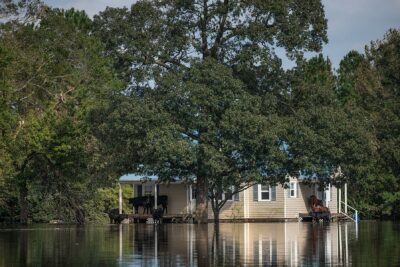The forecasts for our planet are well-documented, and so are the climate impacts affecting people right now. There are many things we can do to help mitigate the worst effects but we may feel overawed and paralyzed by the enormity of it all. Eco-anxiety is real, and it can cause deep distress while preventing meaningful action. So today, on World Environment Day, we are sharing five ways to build resilience both personally and within our communities, so we feel empowered and ready to take actions for the planet.
Nurture Friendships
Humans are social beings, and there is much documented evidence about the importance of friendship to our physical and mental health. In fact, the more people prioritize friendships, the happier and healthier they are. If friendship is essential in ‘normal’ times, it is absolutely critical in times of global crisis. Our lives may be busy and complicated but there are some simple loving actions we can build into our existing routines to ensure that no one is left behind.
- Check in via text with close friends before bedtime. Just saying ‘goodnight’ can make all the difference if someone is struggling with loneliness.
- Invite friends to join you in an activity that you are already doing, such as walking your dog or even going to the store.
- Invite someone who lives alone to join you for a regular meal. It may just be the highlight of their week.
- Open your hearts and doors at Thanksgiving and Christmas. Is there room for one more at the table?
- Note birthdays and other major life events in your calendar so you don’t forget the dates that matter to your friends.
- When you have time to get together, make that time count
Contribute to Your Community
A strong community—like strong friendships—helps root us in belonging. And if we get involved, we can each contribute to a greater good, while reaping many varied personal benefits. Communities can be based around the physical place we live, or a shared interest or faith. They can be identity-based or historic, and most of us belong to several communities. Like friendships, the more we are able to give to our communities, the more we feel grounded, connected, cared for, and safe.
One way to contribute is by volunteering. You may find there is a local community hub for volunteer work, with different options available to you, from enhancing the local area or supporting residents with differing needs, to helping facilitate a sporting event or mentoring at youth clubs. There is strong evidence that volunteering positively impacts our mental health, which means giving is also receiving.
Other ways to help build a cohesive and resilient community are to join in with planned events, participate in online forums and groups, reach out and offer support to other members, and initiate new projects. Activities like founding a community garden or orchard can have a profound impact on our wellbeing, our community, and the environment all at the same time.

Spend Time in Nature
The power of nature to heal and inspire us is well known. Spending time in nature has been shown to reduce depression and anxiety, improve our moods, reduce feelings of stress and anger, and uplift us. And we don’t have to live in a rural area to get the benefits. Parks and gardens are great for boosting our mental health and resilience, and even looking at pictures of nature or spending time examining a wildflower growing in the crack of a parking lot can have a positive effect.
So, be curious. Look around you. There is beauty and wonder everywhere. Let the natural world heal and strengthen you, and then return the favor by working to protect it.
Do Something for Yourself (and the Planet)
We know with absolute certainty that our well-being is tied up with that of our planet. When we make choices that are good for us, they usually benefit our environment, too. Being more active and relying less on cars is one example, and so is eating a plant-based diet. But there are lots of ways to help the Earth that can leave us feeling better, stronger, and more positive in ourselves. They include:
- Taking part in beach and riverside clean-ups. We’re out in nature, spending time with likeminded people, and helping the planet. It’s a win-win-win.
- Ride-sharing. We’re halving our emissions while getting to know someone better.
- Reducing our consumption. Buying stuff may give us a dopamine rush in the moment, but it does not make us happy in the long run, and every item we buy has an environmental cost. Find new ways to create lasting happiness through joyful movement, mindfulness, or spending time outside or with friends.
- Growing our own food. If we have a yard, a window box, or a community garden, we can grow organic fruits, herbs, and vegetables. This connects us to the Earth, boosts our mental health, saves us money, and reduces our environmental impact.
- According to Oxford University researchers, eating a plant-based diet is the “single biggest way” we as individuals can reduce our impact on the planet. It is also delicious, and a great way to protect and improve our own health. Helping others to discover this empowering way of eating magnifies the positive impact, and that is great news for everyone.
Be Kind
Against a backdrop of pandemics, wars, and the environmental crisis, we all experience personal troubles—such as health, financial, family, and work pressures—and many of us have to contend with exhaustion, stress, and anxiety, too.
Can we cut ourselves a little slack? Acknowledging that we won’t get everything right every time, and that we simply cannot do everything can be liberating. We might experiment with ways to improve our well-being, from getting regular nourishing sleep at night to feeling calmer and more in control in our days. And if we can also extend this same loving kindness to the people around us, we can help others feel stronger, calmer, and happier too.



